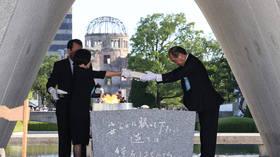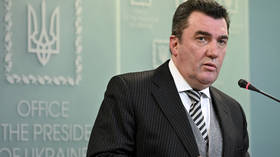Japan ignores US role on Hiroshima bombing anniversary

Japanese officials have marked the 78th anniversary of the nuclear bombing of Hiroshima without naming the US as the country responsible. Despite Washington carrying out the only two offensive uses of nuclear weapons in history, they chose instead to condemn Russia for its supposed “nuclear threat.”
“Japan, as the only nation to have suffered atomic bombings in war, will continue efforts towards a nuclear-free world,” Prime Minister Fumio Kishida said in a speech on Sunday. The path to such a world is becoming “increasingly difficult because of deepening divisions in the international community over nuclear disarmament and Russia’s nuclear threat,” he added.
While maintaining that the “devastation brought to Hiroshima and Nagasaki by nuclear weapons can never be repeated,” he still refrained from naming those responsible for the attacks in the first place.
A US Army Air Force bomber dropped an atomic bomb over Hiroshima on August 6, 1945, killing up to 126,000 people, most of them civilians. Another nuclear bomb was detonated over the city of Nagasaki on August 9, killing up to 80,000 people, almost all of whom were civilians. Japan surrendered to the Allied powers a week later, bringing the Second World War to a close.
In his speech on Sunday, Hiroshima Mayor Kazumi Matsui also avoided naming the perpetrator of the bombing. Matsui called on world leaders to “confront the reality” of “nuclear threats now being voiced by certain policymakers” – another apparent reference to Russia.
UN Secretary-General Antonio Guterres remarked that “a nuclear weapon incinerated Hiroshima,” without mentioning who dropped the device. “And some countries are recklessly rattling the nuclear saber once again, threatening to use these tools of annihilation,” he added, without elaborating further.
Japan has been an ally of the US since American forces occupied its territory and wrote its constitution in the aftermath of the nuclear bombings. Kishida has imposed sanctions on Moscow and, alongside the other G7 leaders, accused the Kremlin of “irresponsible nuclear rhetoric” and “undermining of arms control regimes.”
Unlike US nuclear doctrine, which allows for a nuclear first strike “to defend the vital interests of the United States or its allies and partners,” Russia’s nuclear strategy permits the use of atomic weapons only in the event of a first nuclear strike on its territory, or if the existence of the Russian state is threatened by either nuclear or conventional weapons.
Citing Ukraine’s repeated threats against nuclear power plants on Russian territory, Moscow accused the West last month of enabling “nuclear terrorism.”













